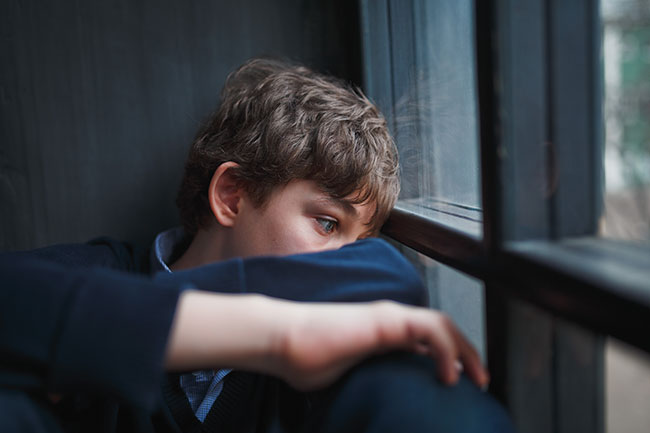
Mental health in today’s teens: Observations in the field
By Dr. Chris Oswald (DC) Colby Bucci (MScPT) and Anna James
Features Clinical Case Studies Patient Care Photo: © Irina Polonina / Adobe Stock
Photo: © Irina Polonina / Adobe Stock Over my 32 years of practice, I’ve seen around 20,000 different patients, therefore, I’ve seen many different physical conditions and of course, mental health issues, as well. What concerns me the most is the decline in adult and teen mental health over the last decade, but more importantly, the rapid decline in teen mental health since the onset of COVID-19.
As a father of three daughters who were recently teenagers, and a son who is about to be a pre-teen, I’ve been observing what Generation Z is continuously being exposed to. I see a clear correlation between the generation’s suffering mental health and today’s toxic culture. As a chiropractor and father, I want to do everything that I can to help minimize teen anxiety and depression. Here are some of my observations on the subject.
Drugs and alcohol
When teenagers are having a hard time processing something emotionally, they will often turn to drugs and alcohol for recreational use as a coping mechanism. Because their brains aren’t fully developed yet, substance use will accelerate into substance abuse much faster in teens than it would adults. For teens with mental disorders, that transition is even quicker.
In a 2016 study of 10,123 teens from the ages of 13-18 years old, it was found that alcohol and drug abuse were highest among the kids with prior anxiety and behaviour disorders. The prior disorders significantly increased both the risk of the teens trying drugs and alcohol for the first time, and also their transition from use to problematic use.
“The rule of thumb is that almost half of kids with mental health disorders, if they’re not treated, will end up having a substance use disorder,” explains Sarper Taskiran, MD, a child and adolescent psychiatrist at the Child Mind Institute.
Drug and alcohol abuse in teens is just as scary if not worse than it was ten years ago. Guest speakers at schools and programs similar to D.A.R.E. can only do so much when it comes to influencing today’s teens to make the right choice. Popular television shows like “Euphoria,” and social media influencers glamorize underage drinking and illegal drug use. It’s not uncommon for teenagers to be exposed to street drugs like illegal prescription pills, LSD, MDMA, cocaine, and mushrooms. On top of all that, it’s also normalized for rappers to write and talk openly about drinking “lean” for instance, which is a mixture of codeine cough syrup, soda, and hard candy.
Adolescents with existing mental disorders like ADHD or bipolar disorder can become aggressive and impulsive, or severely depressed. When you throw drugs and alcohol into the mix, they can become dangerously suicidal. If there’s a car and a lack of driving experience involved, it can turn into the worst-case scenario within seconds.
How do we avoid this? We have to treat the teenagers’ mood disorders EARLY and CORRECTLY.
If you’re unsure about whether or not your child has a psychiatric disorder, here are some telling signs to look out for, from Childmind.org:
- Showing signs of sadness for two weeks or more
- Trying to harm or kill his or herself/planning to do so
- Regular use of drugs or alcohol
- Intense mood swings
- Refusing to eat, binging/purging, or using laxatives for weight loss
- Irrational worries or fears that hinder daily life
- Involvement in serious physical fights (may include a weapon)
- Unable to pay attention in school
Nicotine addiction
There has been a significant increase in nicotine use and addiction in the youth as a result of the release of vaping. Vaping according to kidshealth.org, is “the inhaling of a vapor created by an electronic cigarette (e-cigarette) or other vaping device.” Although it was originally designed to appeal to an older crowd of smokers who were trying to quit smoking because it was promoted as a “healthier” option, somehow, it has also appealed to high school kids who never smoked in the first place.
In a study by David Hammond of the University of Waterloo, it was discovered that among youth from the ages of 16-19 years old, vaping increased substantially by 74% and cigarette smoking increased by 45% from 2017 to 2018.
The vaping liquid contains much more than just nicotine. Some other harmful chemicals and ingredients include: flavorants like diacetyl (a chemical linked to serious lung disease), heavy metals (such as nickel, tin, and lead), and ultrafine particles that can be inhaled deep into the lungs (Surgeongeneral.gov). Nicotine addiction can cause permanent damage to parts of the teenage brain that are responsible for memory, emotion and critical thinking. It can also cause headaches, shortness of breath, irritability, and feelings of anxiousness.
Antidepressants
Antidepressant drugs can be an effective way to treat anxiety and depression in adolescents. However, I think they are prescribed too often and too soon. I’ve seen way too many teen patients who are on medication come into my office and tell me that “all of my friends are on meds these days.” I hate to see this generation of kids move through life numb – they don’t get to feel real emotions or understand that it’s normal to feel sad or anxious sometimes.
Their hormones are already so out of whack because of puberty, and some young women are on birth control which can already make them feel a little off. When you throw antidepressants into the cocktail, today’s teens truly won’t know what it feels like to be their “normal” selves.
Although depression is usually hereditary, it can also be caused by external sources, and therefore, could possibly be fixed without medication right away.
Some factors that could trigger teen depression include: bullying at school, lack of socialization because of social distancing, confusion about sexual orientation, poor diet, pressure to do well in school, lack of sleep, stress from the current state of the world, chronic pain, low self-esteem, problems at home, etc.
If any of my patients are suffering from depression, I suggest the following lifestyle changes:
Exercise: Exercise is the ultimate natural treatment for anxiety and depression. According to HelpGuide, “studies show that exercise can treat moderate to mild depression as effectively as antidepressant medication,” and it’s also a “natural and effective anti-anxiety treatment” because it “relieves tension and stress, boosts physical and mental energy, and enhances well-being through the release of endorphins.”
A recent study from Harvard T.H. Chan School of Public Health found that the risk of major depression is reduced by 26% when a person engages in daily physical activity as simple as 15 minutes of running or one hour of brisk walking.
When following a regular exercise schedule, teens will have sharper memory and thinking, higher self-esteem, reduced inflammation, better sleep, more energy, and stronger resilience when exercise is used as a coping mechanism instead of unhealthy habits.
Meditation: If you are new to meditation, this may seem silly or a little too “out there” for your taste, but it has been scientifically proven to reduce anxiety, depression, and psychological pain. On top of that, it’s been known to be beneficial for sleep, overall mood, and cognition.
You’ve probably meditated before and didn’t even realize it. Any time that you take a few minutes to clear your mind, drown out the noise around you, and focus on your breathing, you’re meditating! This is especially helpful when you’re feeling overwhelmed or stressed out, and you need to take a second to calm yourself down.
Diet: The brain is the engine that keeps the body moving. When it doesn’t receive the fuel it needs, it will shut down. If it receives fuel that isn’t the best quality, it’s not going to produce great results; do you see where I’m going with this? Our bodies need clean, whole foods that provide the vitamins, minerals, and antioxidants that they require to reach their full potential. Have you seen the amount of sugar that’s in today’s junk food and drinks? Teens love candy, soda, and processed foods. Although their metabolism can probably handle it while they’re young, all of that excess sugar is causing damage to their brains and teeth.
Diets full of processed foods and refined sugars can cause damage to the body and brain by decreasing the body’s regulation in insulin, worsening a teen’s mood, causing depression, and promoting inflammation and oxidative stress. Processed foods are okay in moderation, but they definitely shouldn’t be a part of one’s everyday diet.
I suggest that my patients try out a clean diet (cutting out all processed foods and refined sugars and replacing them with whole foods like fresh fruits, vegetables, seeds/nuts, lean meats, fish, etc.) for 2-3 weeks and document how they feel along the way. They will usually notice a difference in their overall mood and energy levels.
Sleep: Sleep and mental health are much more connected than you may think. Teenagers are notorious for pulling all-nighters for last-minute studying or caffeinated internet browsing.
Sleep issues are even more common in patients with anxiety, depression, bipolar disorder, and ADHD. Insomnia can be both a symptom and a cause of mental illness. When one is anxious about something or experiencing negative emotions, it can be challenging to relax and fall asleep.
Studies have shown that depressed patients who experience insomnia are less likely to respond to treatment than those who don’t have sleeping problems. In a longitudinal study of 1,014 teenagers, it was found that insomnia developed before major depression did. The sleep problems preceded anxiety disorders 27% of the time, while they preceded depression a whopping 69% of the time.
To increase the chances of a good night’s sleep:
- Cut out stimulants such as caffeine, alcohol and nicotine
- Put your phone away once you get into bed
- Meditate before falling asleep to promote calmness
- Participate in a regular exercise schedule to release built-up energy during the day
- Make sure that you’re sleeping on a good mattress. I suggest purchasing a tempurpedic mattress topper for back support and comfort.
Chiropractic care
Every day, teens are stressing their neck and back alone by constantly looking down at their phones or computers: in line at the grocery store, on the couch, in the kitchen, doing homework, etc. This is not only ruining their posture, but even worse, aggravating the cervical-thoracic junction, which is at the top of the sympathetic nervous system. When their heads are down, their fight-or-flight response stays activated, and they cannot relax. Chiropractic adjustments can reset the proper alignment in the spine and calm down the sympathetic nervous system. Another way to fix their posture is to make sure their homework station at home follows the proper ergonomic guidelines to stay efficient and safe.
Chronic or acute pain is one of the leading causes of suffering mental health. The mind and the body are connected, so when your body isn’t feeling well, neither will your mind, and vice versa.If a teen is suffering from chronic (over 6 months) or acute (less than 6 months) pain, it’s almost impossible to focus on anything else besides that. How are they supposed to meditate or exercise if they’re in pain every day?
Social media
Today’s teens are unique because they are a part of the social media generation. They’ve grown up with smartphones in their hands – with them at all times.
One huge issue with social media is the unrealistic life and beauty standards that can take a toll on teens, specifically girls. Social media influencers like the Kardashians have normalized cosmetic surgery and photoshopping their bodies to set today’s impossible beauty standards. This has resulted in low self-esteem, eating disorders, depression, and anxiety in adolescents.
Another alarming issue that has come from social media is the diminishing attention spans of teenagers who consume unlimited content. Teens no longer have the patience to sit down and watch a movie, or even a 20-minute-long television show. Instead, they scroll through video apps and watch 15-to-30-second-long videos for hours on end. This results in bigger issues like not being able to focus in school and not being able to drive without checking their phones.
Social media addiction can also cause insomnia. Most teenagers use their smartphones as alarm clocks, so they keep their phone under their pillow. Having their phone within arms reach will only cause temptation to stay online until 3 a.m., resulting in sleep deprivation, irritability and cognitive decline the next day.
Divorced and inattentive parents
Divorce rates are at an all-time high. Divorces can be messy and traumatizing for everyone involved, but specifically teens. Their family unit, which was supposed to be a secure foundation to fall back on in times of need, has now been disrupted. Because divorces are usually complicated and chaotic, parents are too distracted by their own drama to be attentive enough to truly see how their kids are processing their emotions and coping.
I believe most teens suffering from the emotional damage of a divorce should go to therapy to hear from an unbiased professional what’s truly going on and what they can do to better communicate their feelings with their parents. Without properly processing the trauma caused, teens might resort to unhealthy coping habits.This amount of trauma and the unhealthy habits that come with it can result in severe anxiety and depression.
What our teens need from us now more than ever is empathy, clear communication, attention, and natural solutions before we suggest drugs. We need to remember that the world our teens are growing up in today is a completely different one from what we knew. There are so many new factors that we don’t understand, and we need to try harder to figure out why our teens may be acting strange. Instead of scolding and grounding them, we need to dig deeper and offer mental health resources and natural treatments.
 DR. CHRIS OSWALD BSc, DC, owns and operates The Centre for Fitness Health and Performance in Toronto, Ontario. Dr. Oswald is also the founder and creator of MuscleCare, a product line ranging from topical ointments, to ergonomic pillows, to back supports.
DR. CHRIS OSWALD BSc, DC, owns and operates The Centre for Fitness Health and Performance in Toronto, Ontario. Dr. Oswald is also the founder and creator of MuscleCare, a product line ranging from topical ointments, to ergonomic pillows, to back supports.
 COLBY BUCCI BA (KIN), MScPT, is a managing partner of The Centre for Fitness Health and Performance in Toronto, Ontario. He believes in a whole system treatment approach, consisting of manual therapy, education, lifestyle advice and exercise prescription.
COLBY BUCCI BA (KIN), MScPT, is a managing partner of The Centre for Fitness Health and Performance in Toronto, Ontario. He believes in a whole system treatment approach, consisting of manual therapy, education, lifestyle advice and exercise prescription.
 ANNA JAMES earned her B.S. in public relations from the University of Florida College of Journalism and Communications. She now writes blog posts and scientific articles under Dr. Chris Oswald for his company, MuscleCare in Toronto, ON
ANNA JAMES earned her B.S. in public relations from the University of Florida College of Journalism and Communications. She now writes blog posts and scientific articles under Dr. Chris Oswald for his company, MuscleCare in Toronto, ON
Print this page